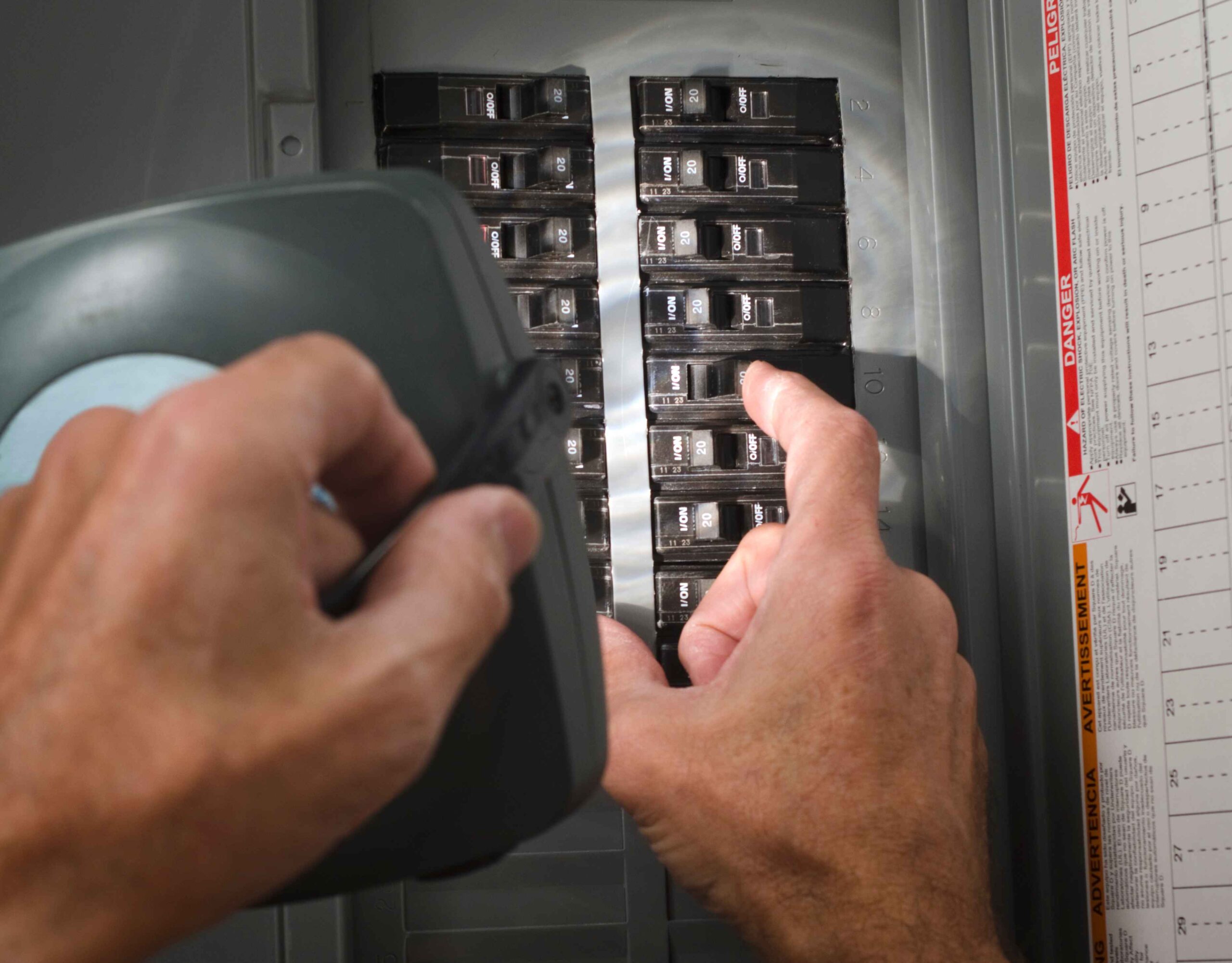Serving Anne Arundel County, Maryland

Should I Upgrade My Electrical Panel?
Your home’s electrical panel may not be something you think about every day—but it plays a critical role in powering everything from your lights to your appliances. As technology advances and our electrical demands grow, older panels can quickly become outdated or overloaded. If your panel is struggling to keep up, it could affect not just your home’s performance, but also your safety.
From flickering lights to tripped breakers and limited capacity, the signs of a failing panel are easy to overlook—until something goes wrong. Staying ahead of the problem is key to protecting your home and preparing for future needs. In this blog, Haramis Electric shares the top signs your panel may need an upgrade and what to expect if it’s time for an update.
What Does an Electrical Panel Do?
Your electrical panel is the central hub of your home’s power system. It receives electricity from your utility provider and safely distributes it to the outlets, lighting, and appliances throughout your house.
Here’s why your panel matters:
- Power Distribution: It routes electricity to each circuit in your home, ensuring that every room and device has access to reliable power.
- Safety Control: The panel includes circuit breakers (or fuses in older models) that automatically shut off power to prevent overheating, overloading, or electrical fires.
- Energy Management: A properly sized panel helps support energy-efficient systems, modern appliances, and smart home upgrades.
- Scalability: Your panel determines how much power your home can handle, which is critical if you plan to renovate, expand, or add high-powered devices.
If your panel can’t meet today’s electrical demands, your home might experience interruptions, inefficiency, or even safety concerns.
Signs You May Need to Upgrade Your Panel
Not all electrical issues mean you need a panel upgrade—but if you’re experiencing any of the problems below, your panel may be telling you it’s time for a change.
Frequent Tripped Breakers or Flickering Lights
If your breakers trip often or your lights flicker when appliances kick on, your panel may be overloaded or undersized for your current energy use.
Your Panel Is Over 25 Years Old
Panels older than two decades may not meet modern safety codes. They often lack the capacity to support newer technology and can degrade over time.
You’re Adding Major Appliances or Renovating
If you’re installing a new HVAC system, EV charger, home addition, or high-powered kitchen appliance, your current panel may not have enough amperage to safely handle the added load.
Your Panel Uses Fuses Instead of Breakers
Fuse boxes are outdated and no longer recommended for residential use. They’re less convenient, harder to replace, and may pose higher safety risks than modern breaker panels.
When your panel is outdated or overstressed, it affects more than just convenience—it impacts your home’s safety and future readiness.
Risks of Not Upgrading an Old Panel
Delaying an electrical panel upgrade may not seem urgent—but over time, an outdated or undersized panel can pose real risks to your home, safety, and comfort.
Here’s what can happen if you hold off too long:
- Increased Fire Hazard: An overloaded panel can overheat or arc, which significantly raises the risk of electrical fires.
- Limited Functionality: You may be unable to add new circuits or power essential upgrades like an EV charger, modern HVAC, or smart appliances.
- System Failures and Blackouts: An outdated panel is more prone to breakdowns, especially during peak power use.
- Lower Home Value: Electrical systems that don’t meet code or can’t support modern loads may turn off potential buyers or slow down a home sale.
- Missed Efficiency Opportunities: High-efficiency appliances and smart home tech may not run properly on an outdated panel, leading to higher energy bills.
In short, sticking with an old panel can lead to more costly and dangerous problems than an upgrade ever would.
What to Expect From an Electrical Panel Upgrade
Upgrading your electrical panel might sound like a major project—but with a licensed electrician, the process is straightforward and well worth the investment. Here’s what typically happens when you choose to upgrade:
- Electrical Load Assessment: A licensed electrician from Haramis Electric will evaluate your home’s current electrical usage and future needs to determine the correct panel size (usually 100, 150, or 200 amps).
- Permitting and Code Compliance: We handle all necessary permits and ensure your upgrade meets local and national electrical codes.
- Old Panel Removal: The outdated panel will be safely disconnected, removed, and replaced with a modern, circuit-breaker-based model.
- New Panel Installation: Your new panel will be installed with labelled circuits, room for expansion, and built-in safety features.
- System Testing: Once installed, we test all circuits and verify that everything is operating correctly and safely.
- Cleaner, Safer Power: You’ll have a future-ready system that can support new technology, larger loads, and safer day-to-day usage.
Most panel upgrades can be completed in a single day, with minimal disruption and long-term peace of mind.
Power Your Home Safely With a Modern Panel
Your electrical panel is the foundation of your home’s power system, and keeping it up to date is essential for both safety and functionality. Whether you’re adding new appliances, planning a renovation, or just tired of tripped breakers and flickering lights, upgrading your panel gives you peace of mind and room to grow.
At Haramis Electric, we’re here to make the process smooth, safe, and stress-free. From honest evaluations to expert installations, we’ll help ensure your home is equipped for today—and tomorrow.
Ready to upgrade? Contact Haramis Electric today to schedule your electrical panel assessment in Crofton or the surrounding areas.
